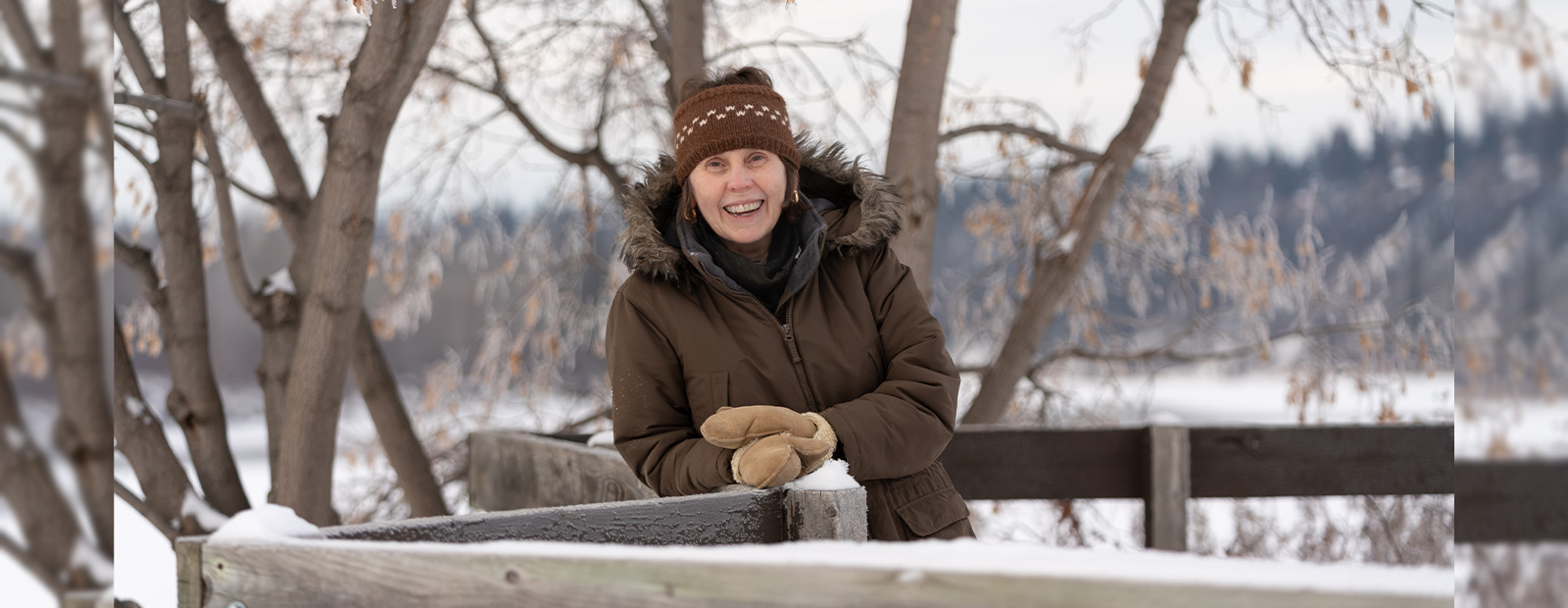Audrey Whitson is settling into her new role as MacEwan’s 30th writer in residence, where she will be available for consultations through April 4.
Raised on a farm in northern Alberta, Whitson showed an early love of writing and storytelling. Until recently, she enjoyed a varied career in social work, theology, editing, project management and public policy alongside her writing life.
Whitson has been the recipient of a number of awards and nominations. Her most recent book, The Death of Annie the Water Witcher by Lightning, was a finalist for the Robert Kroetsch City of Edmonton Book Award. The titular story in her second book, The Glorious Mysteries: And Other Stories, was the first-prize winner of the Room Magazine Short Fiction Award.
Here, she discusses her transition into writing professionally, her visions of characters and her advice for aspiring writers.
What first inspired you to start writing?
Stories and land. Growing up, my mom used to tell us a story that she’d heard from her mother, “The Little Match Girl.” It’s a very sad story, but it was a favourite. I also loved Mother Goose and the Old Mother West Wind series by Thornton Burgess. My parents read a lot, and so did my siblings and I. I think the other thing that was a major influence for me was that my younger brother and I had a number of imaginary friends. We used to play together and create stories in the bush that surrounded our home place. Every day, we’d have things going on with these characters. We knew who they were, what they looked like, what cars they drove and what journeys they were taking. As soon as I could print, I started to write stories.
What made you decide to start writing professionally?
It was a very slow evolution. I knew right when I started writing stories that I wanted to be a writer. Growing up, we used to get The Western Producer, which is an old farm paper. I would send things in and sometimes get published. That helped me get used to the process of submitting things and having them be accepted or rejected. When I was studying social work, I was still taking courses related to literature. I wrote poetry and stories in my 20s. But I didn’t get serious about my writing – in the way of getting it published – until I was in my 30s.
Where do you find inspiration for your writing?
Apparitions. I often encounter images of characters and they’re always in a particular place. I saw Annie, the main character of my last book, in the doorway of the Busby hotel while I was driving by one day after my first book came out, and she just evolved. I knew she had something to do with that hotel, and I just needed to understand who she was. I’m also inspired by the land. People have often remarked that, in my writing, the land and setting is a character. In my life it’s a character. It’s a real, living part of my world.
How does your approach to writing change depending on the style or genre you’re working in?
I do a lot of research for everything I write. Whether it’s fiction, non-fiction, poetry or drama. It’s all the same in terms of research. What I find is that the story itself demands to be told in a certain way. Sometimes I start off thinking it’s a long poem and it turns out to be an essay, or I think it’s an essay and it turns out to be a short story. My first book, Teaching Places, started as a personal, spiritual quest. I journalled a lot and took photographs as I journeyed to special ecological places in Alberta. I was about three years in when I realized I was writing a book. Every story has its own expression.
What are you most looking forward to in this role?
Working with the next generation of writers. I’m always interested in hearing their stories, and understanding the worlds that they’re creating. And also meeting those writers who are established. I look forward to collaborating with all writers, learning from those exchanges, and just helping them to move their writing forward. I think I’m most comfortable in one-to-one encounters with people, looking at their work and helping them to write their stories and find their voice.
Do you have any advice for aspiring writers?
Read, read, read. That can mean different things depending on your genre. That can mean watch; that can mean listen. Sometimes those other forms can inform what you’re doing even if they’re unrelated because they’re still stories being told, just in a different way. The other thing is to practice. Like a musician or any other artist, you have to do it regularly. One thing that is hard to do but is really critical is to ask for feedback. Finding a group of people or a person that you can turn to and exchange work with is key. You also need to feed the well. You need to nurture that source of creativity in you, whatever that is. Walking in nature feeds me. Friendships feed me. Music feeds me. Everybody’s different, you have to find your own way.
Visit MacEwan.ca/WIR to learn more about the writer in residence position, or to make an appointment.
